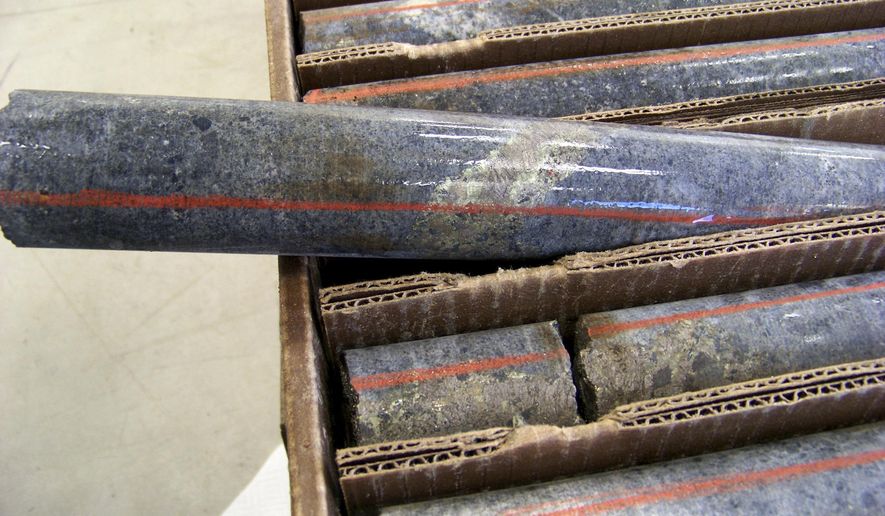President Biden invoked the Defense Production Act on Thursday to ramp up domestic mining of critical minerals needed to manufacture electric vehicle batteries.
The White House said the move will curtail U.S. dependence on China and other authoritarian regimes as it plots its transition away from gas-powered vehicles.
“We need to embrace all the tools and technologies that can help free us from our dependence on fossil fuels and move us towards a more home-grown clean energy,” Mr. Biden said. “We need to end our long-term reliance on China and other countries for inputs that will power the future.”
Invoking the Defense Production Act means the federal government now considers shoring up its critical mineral supply, including nickel and cobalt, vital to the national interest. As such, the White House will be able to boost funding and assistance to domestic companies working to mine those minerals.
However, the administration is not offering loans to companies or proposing to purchase minerals directly. Instead, it will provide assistance with mining operations and conduct feasibility studies on how to modernize the domestic mining industry.
White House officials say the overall impact will be to incentivize domestic mining, rather than subsidize it outright. The decision reflects the deep opposition of congressional Democrats for increased domestic mining, especially any that would take place on federal land.
“We have seen abuses, and we have seen many sites that have been abandoned,” said Sen. Ben Ray Luján, New Mexico Democrat. “The United States government takes responsibility and then it takes a lifetime to be able to go to reclaim, but what’s never talked about are the people in the community that live in that community, how harmed they are.”
Critics say the Democratic opposition has severely constrained Mr. Biden’s attempts to end foreign dominance of the critical mineral supply chain. They say that while funding some feasibility and modernization studies could be helpful, it will do little to speed up the byzantine permitting process to get new mines operational.
“Announcements like today’s, coming barely two months after canceling leases for a mining project on federal land in my district, are an attempt at political cover, not a real solution to actually access American mineral resources,” said Rep. Pete Stauber, Minnesota Republican. “We must look at this Administration’s actions, not their words.”
A report by the London-based firm Benchmark Mineral Intelligence said China produces 80% of the total raw materials used for advanced batteries. Lithium, cobalt, nickel and graphite are all central to producing electric vehicles.
In 2019, China produced 72% of the world’s lithium-ion rechargeable batteries, while the U.S. accounted for 9%. Such batteries are most frequently used to power electric vehicles, the Energy Department says.
The communist regime’s advantage is the result of long-range investment and planning. Beijing is on track to develop at least 107 lithium-ion battery megafactories through 2030. At least 53 of those factories are already up and running.
SEE ALSO: Biden to release 1 million barrels of oil per day from strategic reserve
The U.S. is expected to develop nine megafactories in the same span. Only three are now operating.
“The supply chain for electric vehicle batteries runs directly through China,” said Myron Ebell, director of the conservative Competitive Enterprise Institute’s Center for Energy and Environment. “It’s more or less impossible to open a new rare earth mineral processing plant in the U.S. because of our stringent regulations.”
China’s dominance also stems from its trade partnerships with countries accused of using both slave and child labor. The Democratic Republic of the Congo, in particular, allegedly uses forced child labor to mine raw cobalt, which is then exported to China for processing.
Beijing processes those critical minerals, turning them into electric vehicle batteries in its Xinjiang province, where the communist regime has been accused of violating the human rights of hundreds of thousands of Uyghur Muslims.
GOP lawmakers, most notably those on the House Transportation and Infrastructure Committee, have long tried to block U.S. tax dollars from going to purchasing electric vehicle batters or critical minerals made through slave labor.
“Rather than continue to rely on nations that exploit child labor, we must hold our nation to a much higher standard and empower American workers to responsibly source these critical minerals here under the best environmental and labor standards in the world,” said Mr. Stauber.
Legislation on the topic has been blocked by Democrats each time it’s been brought for a vote in the House Transportation Committee.
“Ending child labor should not be a partisan effort and it remains a mystery to me as to why my Democrat colleagues continue to turn a blind eye to these abuses,” said Mr. Stauber.
• Haris Alic can be reached at halic@washingtontimes.com.




Please read our comment policy before commenting.